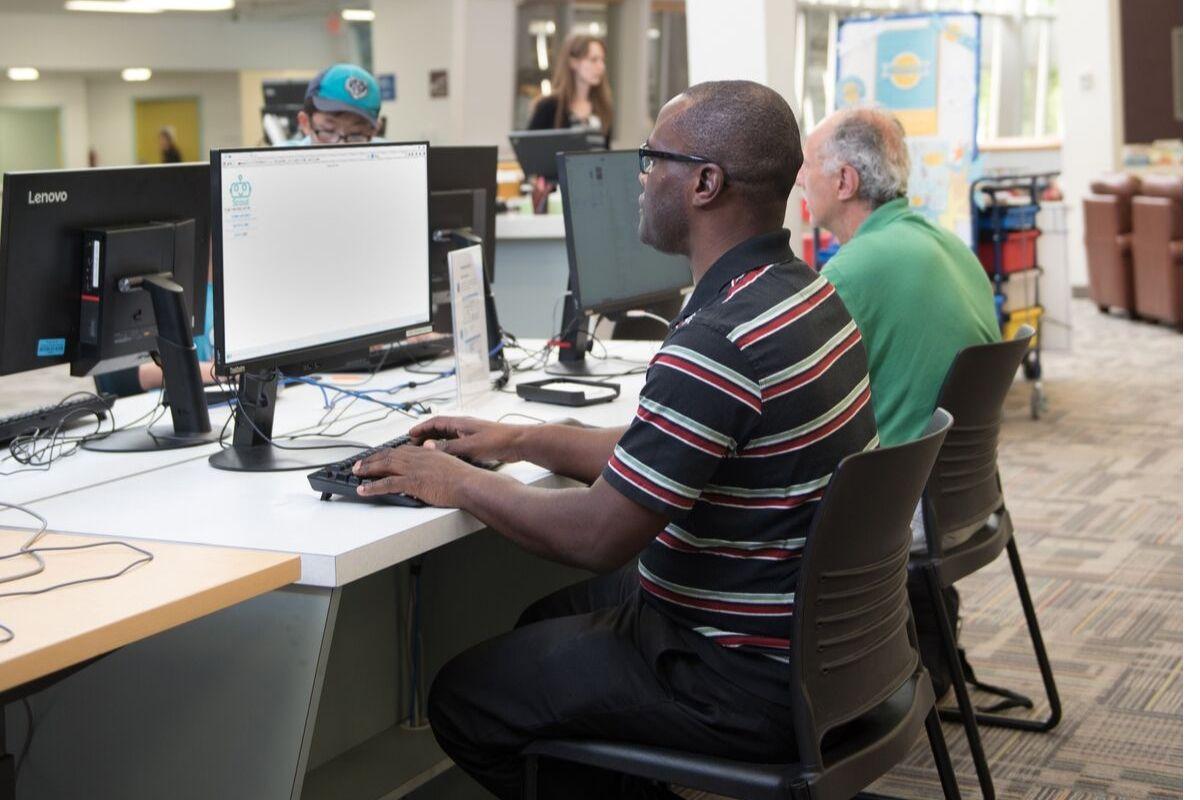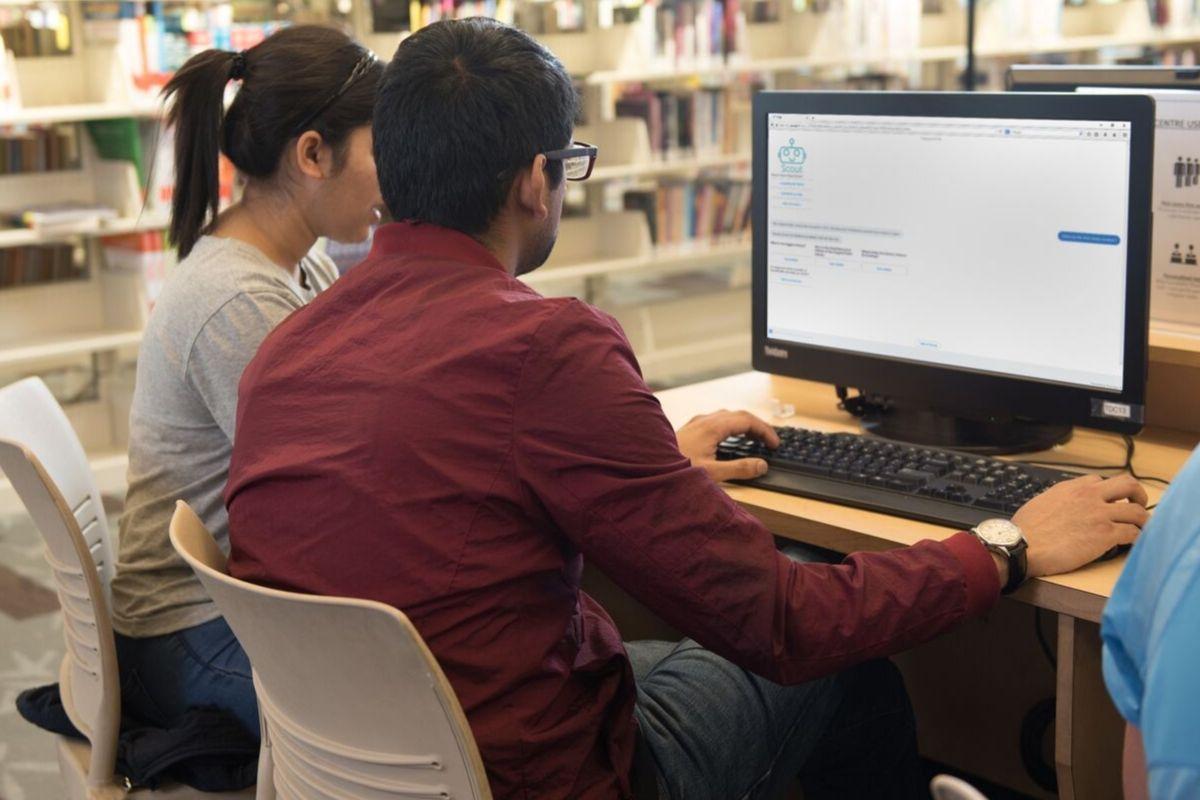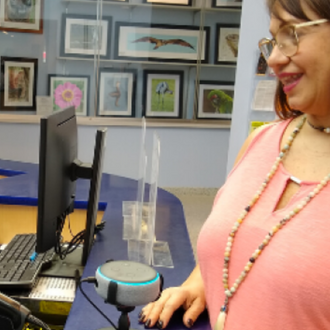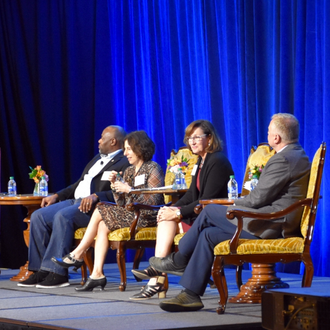Enhancing Customer Service Using Artificial Intelligence
by Cailynn Klingbeil, Writer, Calgary Public Library
Why adopt such a futuristic approach to library services? Calgary Public Library’s leadership team saw many reasons to bring AI into the library.
In January 2018, Calgary Public Library opened Rocky Ridge Library, located on the northwest edge of the city. The library sits inside a 284,000-square-foot city recreation facility and is the first in Calgary to operate on a self-service model.
Rocky Ridge Library’s express model means patrons can pick up holds from self-service lockers and use self-checkouts to borrow materials. While staff are on-site daily to attend to the library’s collection and deliver free programs, they aren’t present all the time.
This service model led Calgary Public Library to build and adopt a new artificial intelligence tool: a virtual assistant called Scout. Scout is a chat service powered by AI, designed to answer patron inquiries and support information-seeking. The name Scout was selected following a staff contest.
As artificial intelligence seeps into people’s everyday experiences online, people now expect to be able to ask simple questions and receive immediate answers, rather than search through FAQs on a website. Calgary Public Library patrons were coming to expect AI, and library staff saw the opportunity to deploy such technology to improve the ease and convenience of using the library.
Additionally, AI was a way for Calgary Public Library to expand library services and multiply impact. Calgary is a sprawling and fast-growing city, home to over 1.2 million people. To better serve communities across the city, innovative service models are required. By using new technology to answer simple queries, employee time once spent answering these questions can be used differently. Ultimately, AI helps bring the library into more people’s lives.

How Do You Build a Bot?
From the beginning, Calgary Public Library intended to pilot Scout at Rocky Ridge Library, where staff were not always available to answer patron questions. Next, the service would be expanded across Calgary’s 21 libraries and introduced on other platforms, including the Library’s website and Facebook Messenger.
So how did Calgary Public Library build this innovative technology? The first step was to put out a request for proposal. In 2017, the library started working with Passage AI, a San Francisco-based company with experience bringing AI to retail settings.
Staff worked extensively with Passage AI to develop the structure and flow of the bot, always considering the experience of the user. Open Scout and three options exist: locations and hours, search for an item and ask a question. Click “ask a question” and Scout asks, “What would you like to know?”

It was up to library staff to train Scout to answer those questions and determine how a conversation would start and subsequently flow, including when a patron needing more information would be directed to a staff member. Using existing documents of FAQs, staff began by feeding Scout common questions such as “Do I have overdue items?” and “How do I log into the Wi-Fi?”
Carolyn Kelso, Business Systems Analyst on Calgary Public Library’s IT team, is the library’s project lead for Scout. Kelso says the “care and feeding” of Scout has been the biggest undertaking for the library, as artificial intelligence is only as good as the data fed into it.
It’s quite a bit of work on the library’s side to make sure the data engine is clean and well optimized. You need to understand the principals of AI; how the structure of the data you feed to it influences the quality of the answers.
Anton Chuppin, IT Interfaces Manager
Early on, staff across the library system were encouraged to try out Scout and ask various questions. A working group of about a dozen library staff also train Scout, feeding it information about library services and evaluating the answers it provides.
The process of building Scout’s knowledge base continues to this day. Weekly training sessions mean Scout is constantly improving and able to answer more questions more accurately. As well, Calgary Public Library continues to work with Passage AI, to discuss how Scout is behaving and functioning. “This project is never finished,” Kelso says.
Lessons Learned
Stephen Gibbs, a selector with Calgary Public Library’s collections department, is a member of the working group training Scout. An early hurdle, he says, was the tone and length of the existing FAQs first fed to Scout. “We learned quickly that if the robot is going to have a conversation, we needed the answers to be succinct and conversational,” he says.
Another challenge was anticipating what kind of questions patrons might ask Scout. “We found people wanted to speak to Scout like it was a person, asking ‘How are you?’ or ‘Tell me a joke,’” Gibbs says.
While such interactions were initially unexpected, Gibbs notes it’s likely because people have become accustomed to being able to play with other robots, like Siri and Alexa. Once library staff realized people would try the same with Scout, they started to feed Scout more questions and answers in that realm, and along the way, a personality began to be developed.

In addition to anticipating questions, staff also worked hard to provide accurate answers. A seemingly straightforward question – like “Can you help me look for a job?” – could have a lengthy answer, as Calgary Public Library offers eResources for job seekers, free career programs and many relevant books. “We do so many things at the library and it was quite a challenge to put all our services and programs succinctly,” Gibbs says.
Staff also had to anticipate interactions on different platforms. Scout first rolled out on catalogue computers at Rocky Ridge Library, then catalogue computers across Calgary’s 20 other libraries. Now, staff are preparing to make Scout available on Alexa, Facebook and Calgary Public Library’s website. “For each platform, we’ve had to anticipate how a conversation might flow,” Kelso says. “It’s been a big challenge.”
With 21 libraries across Calgary, location-specific questions and answers are another consideration. “If someone asks about parking, we need information specific to that location,” Gibbs says. Scout is just starting to answer location-specific questions.
For library systems interested in introducing AI, both Kelso and Gibbs recommend that staff become comfortable working with ambiguity. “What’s true this week may not be true next week, as we’re building it as we go. The technology is always changing,” Gibbs says.
Chuppin recommends libraries start exploring AI now. “I think it’s the way to go. The technology is maturing and it’s only getting better. The sooner we start, the better we will be acquainted to work with this technology and the better the quality we can get.”
Cailynn Klingbeil is the writer on Calgary Public Library's Marketing and Communication team. She previously worked in journalism and her writing has appeared in numerous newspapers and magazines.
Related Articles

Broward County Library Welcomes Newcomers with Voice-Assisted Technology
Broward County Library
Learn how Broward County Library implemented emerging technology to assist patrons who do not share a common language.
Learn More

2019 ULC Forum Recap
Urban Libraries Council
Discover key highlights and takeaways from the 2019 ULC Forum: Preparing to Lead on AI and Digital Citizenship, which took place on October 16-18 in Salt Lake City.
